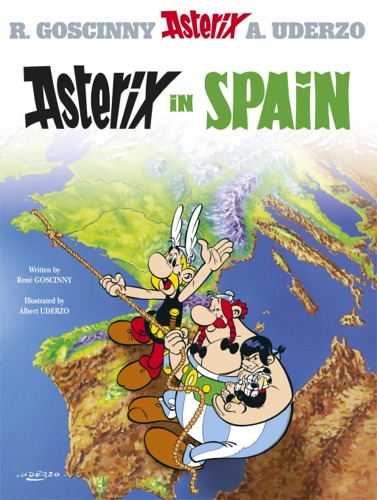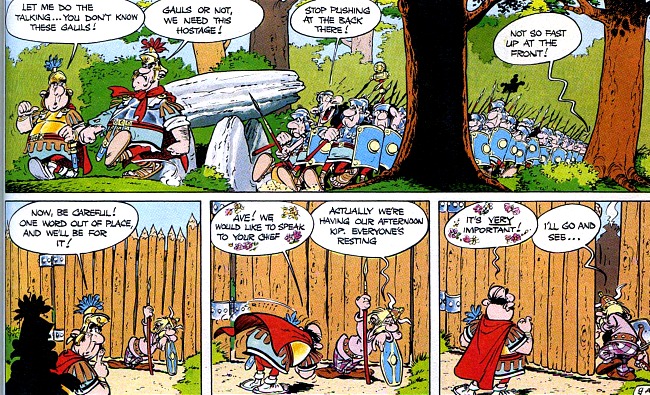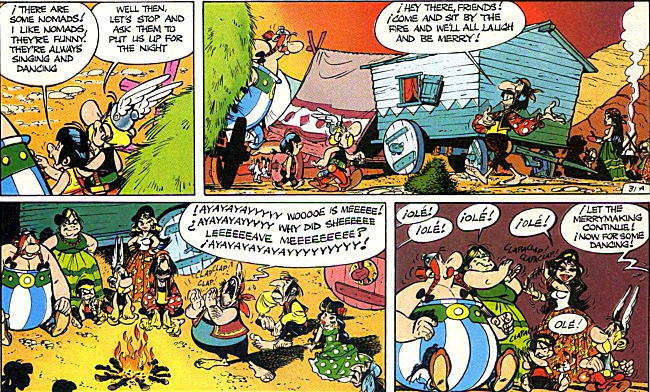Asterix vocabulary
Glossary 5/6: Asterix in Spain
Astérix en Hispanie, Astérix en Hispania, Astèrix a Hispània, Asterix Hispanian, Astérix na Hispânia, Asterix in Iberia, Asterix in Spanien, Asterix in Hispania, Asterix i Spanien, Asterix Hispaniassa, Asteriks İspanya'da.
I can't give you free Asterix books, but for six of them I give you a glossary of all the Latin, and the unusual words, phrases and word games.
The glossary:
- Various gods and goddesses appear in all the Asterix books. Toutatis, Belenos, Belisama, Taranis, Lug, Epona (Gaulish); Jupiter, Mercury, Pluto, Minerva, Apollo, Vesta (Roman); Zeus, Hermes, Hades, Poseidon, Athena, Ares (Greek); Ra, Isis, Osiris, Horus, Anubis (Egyptian).
- Gaul (p3). A province of the Roman empire. Today it's France.
- indomitable (p3). A person who will always resist; unconquerable.
- fortified (p3). Made into a military base with strong walls.
- shrewd (p4). Understands a situation quickly; cunning, clever like a fox.
- a potion (p4). A magical liquid.
- a druid (p4). A Celtic priest.
- a menhir (p4). A megalith, like the big stones at Stonehenge and Carnac.
- a wild boar (p4). A wild pig. Obelix's favourite food.
- mistletoe (p4). A small green plant with white fruit. It grows on trees, and people say it is magical.
- a bard (p4). A poet, musician and teacher.
- majestic (p4). Impressive, like a king.
- 45 BC (p5). 45 years before Christ.
- Hispania (p5). A province of the Roman empire which is now Spain.
- “It’s luverly” (p5). “It’s lovely” - pronounced by a market trader with a London accent.
- Pompey (p5). A Roman general who fought against Julius Caesar but lost.
- Thapsus (p5). A city in what is now Tunisia.
- a yoke (p5). Literally, a piece of wood used to attach a harness to a pair of oxen (an ox is a large cow) so they can pull a cart or a plough, so “under the Roman yoke” means working under the control of Rome".
- a legionary (p5). A Roman soldier.
- a triumph (p5). In this context, a big party to celebrate his victory.
- Iberia (p5). Today, the peninsula of Iberia is Spain and Portugal.
- "lending him their ears" (p5). A small joke about the famous speech by Mark Antony in Shakespeare’s play Julius Caesar: “friends, Romans, countrymen, lend me your ears. I come to bury Caesar, not to praise him”... in other words “listen to me”.
- laurels... I must have rested on them (p6). The bay laurel plant (Laurus nobilis) was used by the Romans as a seasoning in cooking, particularly stews, and also to make a temporary crown for the winner of a game or competition. There is an English idiom “to rest on your laurels” which means to be so happy about one success that you stop working.
- veni, vidi, vici (p6). A famous speech by Julius Caesar. “I came, I saw, I conquered”.
- huevos (p7). "Eggs" in Spanish.
- a sling (p7). A small weapon for throwing stones.
- heirless (p8). A terrible joke about “hairless” (bald) and “heir-less” (not having a child to inherit your property when you die).
- ...will answer with their heads (p8). "...Will have their heads cut off".
- baddies (p10). A child’s word for bad people.
- CHAAAR... (p11). “Charge!”... oops...
- thumbs up (p11). The gesture of a defeated gladiator asking for mercy.
- a kip (p13). A nap, a short sleep... a siesta.
- a holy terror (p14). A child who makes a lot of trouble. This is not a very common expression.
- beati pauperes spiritu (p15). From the Bible - “blessed are the poor in spirit”.
- to hit it off with (p20). To get on well with somebody, to make a new friend.
- Bacteria (p20). The name of one of the women of the village.
- to get you down (p22). (1) to make you feel depressed (2) to get you down (from this tree, etc).
- to bark up the wrong tree (p22). To make a mistake. "You're barking up the wrong tree" is a common English expression.
- to be clapped in chains (p22). To have chains attached to your arms and legs.
- Salisbury Plain (p23). A flat part of southern Britain. Stonehenge is in the middle of it.
- a gourd (p24). A bottle made by drying a plant like a pumpkin.
- to beat someone down (p26). To reduce a price by negotiation.
- (still) wet behind the ears (p27). Very young and inexperienced.
- It's Spainful (p27). A terrible joke - It’s painful.
- a basquet (p28). A Basque basket.
- Vacceianated (p28). Another terrible joke - vaccinated.
- a clip over the earhole (p31). A slap on the side of the head.
- the same old rut (p31). A rut is a long hole in the road made by wheels. To be stuck in a rut is to have a routine, boring life.
- Pompaelo (p32). The modern city of Pamplona.
- The Repleat Tourist (p33). An archaic way to spell “replete”.
- I'm for the high jump (p34). An expression - "I’ll be punished".
- breakdown wheelwright (p37). A breakdown garage for carts.
- fodder (p38). Food for horses, cows, etc.
- full of beans (p40). If a horse eats a lot of beans, it will be hyperactive, so this expression means "very lively".
- Vandalusia (p41). The original name of Andalucia, country of the Vandal people.
- capirote (p41). The druids in the picture are wearing the capirote hood, which today is worn by Christians celebrating Semana Santa (Holy Week) in some parts of Spain, especially Seville. (Well, yes, also by American racists.)
- to cotton on (p41). An English expression - to realise.
- dope (p42). (1) an idiot (2) narcotic drugs (3) information
- civvies (p42). A military expression. Civilian clothes (not military uniform).
- the C-in-C (p43). The commander-in-chief.
- pax Romana (p44). Latin for "Roman peace". The Roman army was like a police force in the countries it conquered.
- panem et circenses (p44). Latin for "bread and circuses". A quotation from Juvenal, who said the citizens of Rome had given up their democratic rights in return for free food and entertainment.
- an aurochs (p45). A wild ancestor of today’s cows. The aurochs has been extinct since 1627.
- an aurochero (p47). From torero, Spanish for bullfighter.
- an aurocheador (p47). From toreador.
- Wash out! (p47). "Watch out!" (This is Obsequius, who still has a speech impediment after the commander-in-chief hit him).




